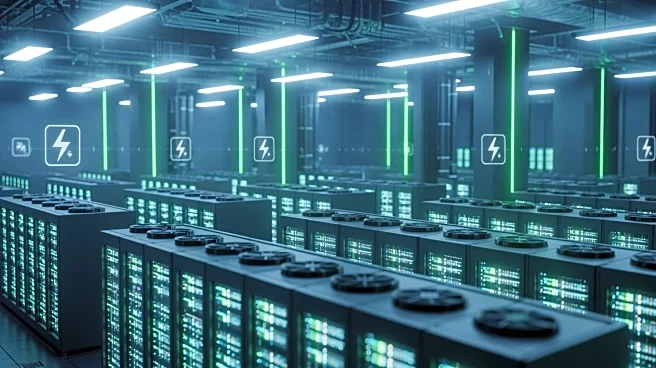What's Happening?
Data center operators are increasingly focused on securing access to the grid, as artificial intelligence (AI) and high-performance computing (HPC) applications place extraordinary demands on power quality.
Traditional workloads have largely managed power quality issues, but AI/HPC applications introduce new challenges due to their compute-intensive nature. These applications are vulnerable to power anomalies such as voltage fluctuations, frequency deviations, and harmonics, which can lead to processor errors, memory instability, and system failures. The rapid, uneven power usage by AI models generates harmonics that distort voltage waves, contributing to 'dirty' power. This can result in energy loss and inefficiencies in power generation and transmission.
Why It's Important?
The implications of poor power quality are significant for data centers and the broader grid infrastructure. As AI workloads increase, the risk of power disturbances affecting sensitive equipment grows, posing financial, operational, and reputational risks. Addressing these challenges is crucial for maintaining the integrity of AI models and ensuring reliable data access. The introduction of capacitive energy storage systems (CESS) offers a solution by balancing power supplies during voltage surges, counteracting subharmonics without increasing cooling requirements or shortening chip lifespans. This technology is vital for data centers to mitigate power quality issues and support the growing demand for AI applications.
What's Next?
Data center operators are encouraged to take proactive measures to ensure power quality. This includes consulting on harmonics during system design, deploying smart harmonic filters, using power factor correction equipment, and collaborating with utilities to forecast and manage large AI loads. Adhering to utility interconnection standards is also essential. As power quality is a system-level problem, these steps are necessary to prevent the erosion of power quality and its associated consequences. The adoption of new technologies like CESS will play a key role in solving subharmonics and improving the overall impact of data centers on the grid.
Beyond the Headlines
The focus on power quality in data centers highlights broader issues related to infrastructure modernization and energy efficiency. As AI applications continue to grow, the need for robust power management solutions becomes increasingly critical. This development may drive innovation in energy storage and power management technologies, influencing future data center designs and operations. Additionally, the collaboration between data centers and utilities could lead to improved grid resilience and reliability, benefiting both industry stakeholders and consumers.










